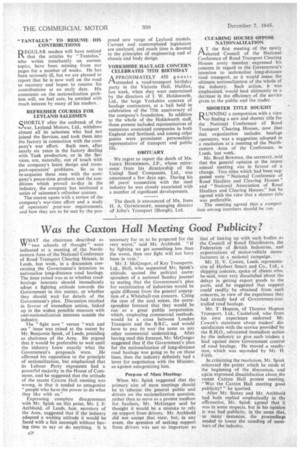Was the Caxton Halt Meeting Good Publicity?
Page 22

If you've noticed an error in this article please click here to report it so we can fix it.
WHAT the chairman described as VY"two schools of thought" were indicated at a .meeting of the Northeastern Area of the National Conference of Road Transport Clearing Houses, in Leeds, last week, in a discussion concerning the Government's intention to nationalize long-distance road haulage. The issue raised was as to whether roadhaulage interests should immediately adopt a fighting attitude towards the Government in this matter, or whether they should wait for details of the Government's plan. Discussion resulted in favour of immediate action, linked up in the widest possible measure with anti-nationalization interests outside the industry.
The "fight now" versus "wait and see" issue was raised at the outset by Mr. Benjamin Spink, of Leeds, presiding as chairman of the Area. He argued that it would be preferable to wait until the industry knew exactly what the Government's proposals were. He affirmed his opposition to the principle of nationalization, but emphasized that its Labour Party exponents had a powerful majority in the House of Cornmons, and he suggested that the attitude of the recent Caxton Hall meeting was wrong, in that it tended to antagonize "people who have the power to do what they like with us."
Expressing complete disagreement with Mr. Spink on this point, Mr. J. F. Archbold, of Leeds, hon. secretary of the Area, suggested that if the industry adopted a waiting attitude it would be faced with a fait accompli without having time to say or do anything. It is
necessary for us to be prepared for the very worst," said Mr. Archbold. "If by fighting we get something less than the worst, then our fight will not have been in vain."
Mr. J. McGregor, of Key Transports, Ltd., Hull, who supported Mr: Spink's attitude, quoted the political correspondent of a national Sunday journal 'as stating that the Government's plan for socialization of industries would be quite different from the general conception of a Whitehall-run concern. Citing the case of the coal mines, the correspondent forecast that they would be run as a great public corporation. which, emplOing commercial. methods, would be a cross between London Transport and the B.B.C., and would have to pay its way: the same as any other commercial undertaking. After having read this forecast, Mr;McGregor suggested that if the Government's plan for the nationalization of long-distance road haulage was going to be on those lines, then the industry definitely had a lever for negotiation with the Minister, as against antagonizing him.
Purpose of Mass Meetings
When Mr. Spink suggested that the primary aim of mass meetings should be to educate the general public and drivers on the nationalization question, rather than to serve as a protest medium for hauliers, Mr. McGregor said he thoaght it would be a mistake to rely on support from drivers. Mr. Archbold did not accept that view, but, in any event, the question of seeking support from drivers was not so important as that of linking up with such bodies as the Council of Retail Distributors, the Federation of British Industries, and organizations of motor-vehicle manufacturers in a national campaign.
Mr. H. V. Cowen, Leeds representative of Herbert Smart and Co., Ltd., a shipping concern, spoke of clients who, he-said, were very dissatisfied about the delays in getting export goods to the ports, and he suggested that support could readily be obtained from such concerns, in view of the experience they had already had of Government-controlled road • haulage.
Mr. T Hopton, of Thomas Hopton Transport, Ltd., Castleford, who from his own experience endorsed Mr. Cowen's statement about traders' dissatisfaction with the service provided by the R.H.O., advocated immediate action by the industry to give such traders a lead against more 'Government control of road haulage. He moved .a resolution, which was seconded by Mr. H. Firth.
In criticizing the resolution, Mr. Spink reiterated the points which he made at the beginning of the discussion, and again expressed dissatisfaction about the recent Caxton Hall protest meeting. "Was the Caxton Hall meeting good publicity?" he queried. ,
After Mr. Storey and Mr. Archbold had both replied emphatically in the affirmative, Mr. Spink agreed that it was in some respects. but in his opinion it was bad publicity, in the _sense that, in • Many instances, the proceedings tended to lower the standing of members of the industry.




























































